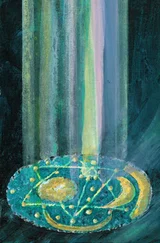He would, in fact, be freer than I was, because I couldn’t go anywhere. And then the notion blossomed in my mind: I wanted to go . Not simply home, to the safety of the third floor left. I wanted out of that place, out of the goddamned rules and regs, out of the boring prison of Ellyson Field. I wanted to find Eden. I didn’t care who she had been and what color she was and where she came from. I didn’t care where she was living or even what she was doing now or wanted to do for the rest of her life.
I wanted to be with my loving woman.
When I woke in the morning, Miles was already gone. His bunk was neatly made up, the sheets and blanket crisp in the lemon-colored morning light. I showered and dressed quickly and walked to the chow hall. Sal and Max were already there, full of plans for the party that night, already spending the payday money. But Miles wasn’t around. I saw Freddie Harada behind the servers in the kitchen and waved him outside. He slipped out the side door.
“Hey, man, I’m busy,” he said. “What you want?”
I told him about Miles Rayfield and warned him that Cannon and McDaid were sure to come looking for him. He looked scared. I asked him where Miles was.
“He was here when we opened,” he said, his eyes darting everywhere. “About six. He just had coffee and a roll and sat ’way in the back for a long time, writing letters.”
“He look okay?”
“Same as always.”
We went back inside. Sal was talking about a girl Max had met in the Dirt Bar the night before. Six foot three and ninety pounds.
“You could open a letter with her and Max falls right in love,” Sal said.
“It was lust, Sal, not love.”
“It must have been like banging a pair of scissors.”
“Worse,” Max said.
I asked if they’d seen Miles Rayfield.
“Yeah, matter of fact,” Sal said. “He was out on the steps of the barber shop. Oh, half an hour ago. Writing letters. Why? What’s up?”
“Nothing,” I said.
Boswell came over and sat down and told us that Harrelson had been transferred to the U.S.S. Saratoga . “Out of Pearl,” he said, rolling his eyes. “Oh, my, how I’d like to get one of them Hawaiian leis.”
“That’s a truly terrible joke, Bos,” Sal said.
“Yeah,” Max said. “Leave the jokes to the Jews.”
“Well,” Boswell said, “he’s gone.”
I thought: Good riddance, you rat stool pigeon.
After breakfast Sal and Max said they’d see us tonight and headed for the hangars, while Boswell and I walked together to the Supply Shack. Donnie Ray called muster. Everybody was there except Miles Rayfield.
“He was just at breakfast,” I said. “Let me go find him.”
“Make it snappy,” Donnie Ray said, sounding annoyed. “The man’s technically over the hill.”
I hurried out. But Miles wasn’t at the barber shop or in the barracks, the chow hall, the infirmary or the post office. Yeah, he’d been at the post office, all right, the civilian said. Bought two dollars worth of stamps. Quite a while ago. Nobody’d seen him at the other places. I went back to the Supply Shack and told Donnie Ray.
“Goddamn, I’ll have to mark him AWOL,” he said with a sigh.
“Why don’t you alert the infirmary first?” I said. “Maybe he got sick somewhere and they’ll find him.”
Donnie Ray sighed. “Yeah, and maybe he’s halfway to Mobile right now.” He glanced at his watch and chewed the inside of his mouth. “Well, you better start swabbin down, sailor. It’s your turn.”
He stared at the telephone. The aroma of fresh-cut grass drifted through the screened windows. Insects buzzed. Helicopters started chugging into the sky. I walked down to the closet where we stored the mops and buckets and soap, and opened the door.
Miles was hanging from a length of gray clothesline tied around a water pipe. His neck was bent at a right angle, the rope digging deep into his flesh. His face was blue.
I guess Becket cut him down. Or maybe it was Donnie Ray. I don’t know for sure. I do know that Boswell and Parsons and Donnie all were shouting for an ambulance, for medics, for someone who could do mouth-to-mouth: Hurry now still a chance that’s it easy boy okay hold him soft . I remember hands reaching, then all lifting, then tearing open a shirt; rubber heels on the concrete floor; an empty wash bucket going over and men grunting. Jesuschrist now what in the fuck would he wanna do that for? And more shouts and doors slamming and the incessant ringing of a single telephone. All that happened: the logistics of death.
I remember staring at the gouged skin of Miles’s neck. I remember him lying on the painted concrete deck that he would never walk again or curse again or swab down again on a Friday afternoon. I cursed the Navy. And I cursed God. And I cursed Red Cannon. I cried too, cradling my dead friend’s head, feeling the heat drain away; just sobbed like a boy, until the medic came at last and tried to thump the dead heart back into life before saying that it was too late, the man was dead and hey, sailor, what was his service number?
Becket walked me outside.
Just like that (I said to Becket, in some fumbling way), Miles Rayfield was gone. And now that it had happened, I realized that he had been going away for days. First they took his work away. The paintings, drawings, paints and chalks: all had disappeared. Then they took his tongue, forcing him into tears and silence. And now he’d done what they couldn’t do: removed himself from the Navy and the earth itself.
Miles you son of a bitch , I said out loud. Why’d you do this, you dumb fuck? Why didn’t you just run? Why’d you have to loop a rope around your goddamned neck?
And then finally Becket said “Okay, dat’s enough. Be a man, Michael. Right now.”
So I wiped my eyes and took a deep breath and straightened up and exhaled hard and then walked back to the Supply Shack. Becket let me go alone, and I reached the building just as the corpsmen were carrying Miles’s body on a stretcher to a waiting Navy ambulance. The body was covered with a blanket. The corpsmen looked vaguely puzzled as they heaved Miles up into the back, slammed the double doors, then drove away. I went inside and saw Donnie Ray looking at me strangely.
“Maybe you ought to take the rest of the day off,” he said.
“No. It’s all right.”
He looked out at the field.
“It’s a tough thing, seeing somethin like that,” he said. “Combat’s a lot easier.”
“I said I was all right.”
“You don’t look all right.”
“He was my friend . I liked him. That’s all.”
“Okay,” he said. “But you can get lost if you want.”
“There’s some things to do. Like calling his wife.”
“His wife?”
“Yeah, he talked about her all the time.… A wife. Back in Atlanta. And he’s got a mother too. Same town.”
“Christ.”
“Someone’s gotta call them.”
“Yeah. Someone’s gotta call them.”
He picked up the phone on my desk and asked for Maher in the admin building. I heard him speaking about next of kin and turned around to examine Miles’s desk. There was no sign that he was thinking of checking out, just an ashtray, a pile of requisition forms, some pencils. I put one of the pencils in my pocket. Then stood there and looked out through the screened windows at the hot June morning. Nothing had changed. Sailors ambled down the crosswalks. Helicopters thumped in the sky. I tried to imagine what Miles was thinking a few hours earlier, his heart beating as he came to his decision. Whatever he thought, whatever pain or grief or shame he felt, it had ended forever.
Читать дальше












